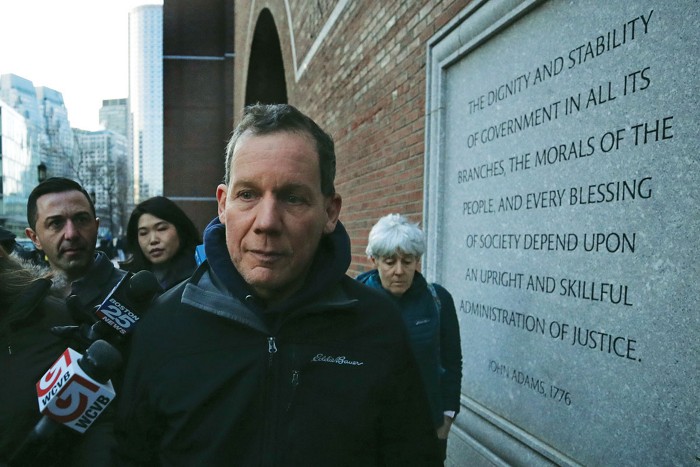UPDATE
Lieber appeared at a Jan. 30, 2020, hearing shackled and wearing an orange jumpsuit.
- His bail was set at $1 million cash.
- Other conditions of release included surrendering his and his wife's passports, disclosing foreign bank accounts, and agreeing to have no contact with Wuhan University of Technology, Peking University, and the Chinese Academy of Sciences.

Credit: Associated Press
Lieber was released from the federal courthouse in Boston on Jan. 30.
Harvard chemist Charles Lieber charged with fraud
Feds allege that he failed to disclose Chinese funding to US agencies and his university
by Bethany Halford , Andrea L. Widener
JANUARY 28, 2020 |
Charles M. Lieber, the chair of the chemistry and chemical biology department at Harvard University, was arrested on Jan. 28 and charged with fraud.
The complaint alleges that Lieber hid his financial ties to China’s Thousand Talents program from the US National Institutes of Health (NIH) and the Department of Defense (DOD), as well as from his own university.
At a court hearing on Jan. 28, Marianne Bowler, a judge with the US District Court for Massachusetts, denied bail and ordered Lieber to stay in the custody of the US Marshals Service after US prosecutors argued that he is a “serious flight risk.” His next court hearing is scheduled for Jan. 30.
Lieber is charged with a single felony count for making false statements to US government agencies. The maximum sentence for such a charge is 5 years in prison, 3 years of supervised release, and a $250,000 fine, the Department of Justice says. His attorney is Peter K. Levitt of the firm Donnelly, Conroy & Gelhaar.
Lieber could also face federal debarment, which would prohibit him from receiving federal grant money. Federal agencies may debar people for reasons including a fraud conviction or a “willful violation of a statutory or regulatory provision or requirement applicable to a public agreement or transaction” (2 CFR § 180.800).
“The charges brought by the US government against Professor Lieber are extremely serious,” the university says in a statement. “Harvard is cooperating with federal authorities, including the National Institutes of Health, and is conducting its own review of the alleged misconduct.”
“I was completely shocked when I saw the news this morning,” says Bozhi Tian, who did his graduate research with Lieber and is now a professor of chemistry at the University of Chicago. He declined to comment further on the case.
Lieber “is a brilliant scientist, and I’ve always appreciated his mentorship,” says Adam Woolley, who was a postdoc in Lieber’s lab and is now a chemistry professor at Brigham Young University. “I was surprised to hear of the allegations, and I truly hope this is some sort of misunderstanding.”
Lieber has been a chemistry professor at Harvard since 1991. He is on paid administrative leave indefinitely, the university says. Lieber is a former member of C&EN’s advisory board and a former editor of the American Chemical Society journal Nano Letters (ACS publishes C&EN).
The complaint alleges that in 2012, Lieber signed a contract with Wuhan University of Technology (WUT) to participate in China’s Thousand Talents program, a state-run effort that seeks to recruit scientists from other countries. In his role as a “strategic scientist” at WUT, Lieber was paid up to $50,000 per month plus approximately $150,000 per year in living expenses. He also received $1.5 million to start up and fund a research lab at WUT. The complaint includes several emails that Lieber allegedly sent outlining how he should be paid and in what currency.
In addition, Lieber allegedly signed a contract that obligated Harvard to become part of a cooperative research program that allowed WUT scientists to visit the university up to two months each year. The complaint says he did not inform university officials of the agreement, which was for “advanced research and development of nano wire-based lithium-ion batteries with high performance for electric vehicles.”
Harvard learned about the collaboration with WUT in 2015 and confronted Lieber. According to the complaint, Lieber acknowledged a collaboration but not that he was paid. Lieber allegedly said that WUT was using Harvard’s name and logo without his consent.
The complaint also alleges that in spring 2018, Lieber lied to DOD investigators about his affiliation with the Thousand Talents program and his funding from WUT. Lieber has been a principal investigator on at least six DOD grants totaling $8 million since 2009, the complaint says.
Later that year, the NIH asked Harvard about whether the university or Lieber failed to disclose his financial relationship with China. Lieber has been a principal investigator on at least three NIH grants totaling $10 million since 2008. After interviewing Lieber, Harvard responded to the NIH that he had “no formal association with WUT” and “is not and has never been a participant in” the Thousand Talents program.
“I believe that Lieber caused Harvard to make materially false and misleading statements about his connection to WUT and the Thousand Talents Plan in that written submission,” FBI Special Agent Robert Plumb says in an affidavit submitted to the court.
No comments:
Post a Comment
Comments always welcome!